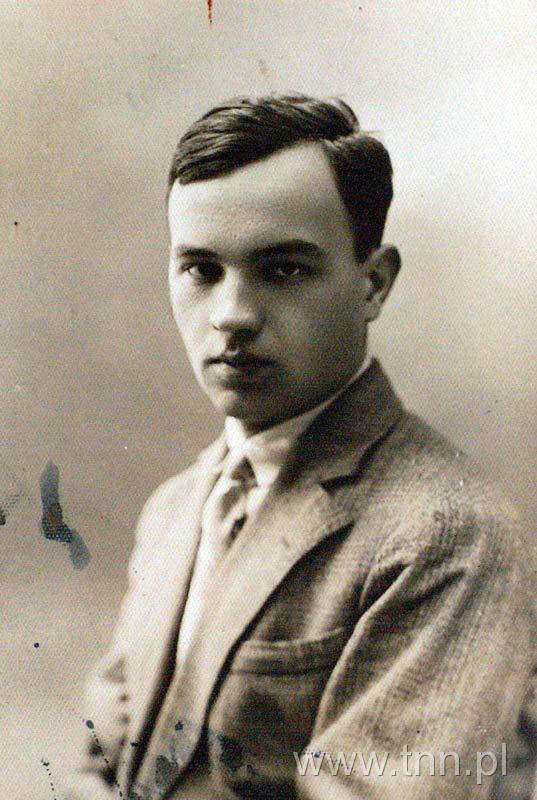Queer Places:
Barber Shop, Krakowskie Przedmieście 46, 20-002 Lublin, Poland
Lublin Cemetery, Lipowa 16, 20-024 Lublin, Poland
 Józef
Czechowicz (15 March 1903 – 9 September 1939) was an avant-garde Polish poet.
Known as a nostalgic, catastrophic author, he was also the leader of the
literary avant-garde and bohemians in Lublin.[1]
For this visionary poet, verse seemed to be a question of imagination; he
would play with word consonances, dreamlike associations, musicality, and
create picturesque visions.[2]
Czechowicz used to live and create in Lublin; he also died there tragically, a
few days after World War II had started.[1]
Józef
Czechowicz (15 March 1903 – 9 September 1939) was an avant-garde Polish poet.
Known as a nostalgic, catastrophic author, he was also the leader of the
literary avant-garde and bohemians in Lublin.[1]
For this visionary poet, verse seemed to be a question of imagination; he
would play with word consonances, dreamlike associations, musicality, and
create picturesque visions.[2]
Czechowicz used to live and create in Lublin; he also died there tragically, a
few days after World War II had started.[1]
Józef Czechowicz came from a poor family living in Lublin. He was born in a
basement flat, which has not survived to these days, in Kapucyńska 3 Street.[1]
His father, Paweł Czechowicz, worked as a janitor and, later, as a meter
leader in the Warsaw Bank in Lublin. In 1912, he died due to a severe mental
disease. Józef Czechowicz's mother, Małgorzata, née Sułek, was a good-natured
person of a tiny posture. 10 years older than her husband, she died in 1936.[3]
The poet dedicated to her many of his poems. Apart from Józef, Paweł and
Małgorzata had three children, Janek, Katarzyna and Stanisław.
In 1913 Czechowicz went to a Russian primary school in Lublin and graduated
from the First Seven-Form City School in 1917. During the Polish-Soviet War,
in 1920, he volunteered to join the Polish army but later came back home to
continue his education. The poet attended the Teacher’s College, the Higher
Teacher’s Course in Lublin and completed his education in 1929, graduating
from the Institute of Special Pedagogy in Warsaw.[1]
At first, he worked as a teacher in Brasława, Słobódka and
Volodymyr-Volynskyi; he also taught in a special school in Lublin, whose
manager he eventually became.[3]
While his first volume of verse, kamień (stone) was printed
in 1927, it is considered that he officially made his debut, publishing in the
first issue of Reflektor "Opowieść o papierowej koronie" (A Story of
a Paper Crown), poetic prose whose protagonist is Henryk, a disappointed
homosexual lover and a failed suicide.
Józef Czechowicz was a homosexual. His sexual orientation significantly
influenced his writing[4]
but it also brought down repression on him.
He also worked as a journalist and an editor of newspapers and magazines
based in Lublin. He followed this occupation after he moved to Warsaw in 1933.
He belonged to Polish Teachers' Union and supported many of his writing
friends, with both finances and publishing. He would take care of a group of
poets who used to live at Dobra 9 St: Henryk Domiński, Wacław Mrozowski and
Bronisław Ludwik Michalski. While he was living in Warsaw, he developed
friendships with poets such as Czesław Miłosz and Anna Świrszczyńska.[1]
As Alina Kowalczykowa indicates, in the poetry volume nuta człowiecza
Czechowicz envisioned himself being �struck by a bomb�.[2]
Having heard about the outbreak of World War II, Czechowicz left Warsaw and
came back to Lublin. He was convinced that being outside the capital city
would make him safe. On 9 September 1939 between 9 and 10 a.m. he was at the
barber's at Krakowskie Przedmieście 46 St. He died when the building was
bombarded.
My published books:


BACK TO HOME PAGE

- https://en.wikipedia.org/wiki/J%C3%B3zef_Czechowicz
 Józef
Czechowicz (15 March 1903 – 9 September 1939) was an avant-garde Polish poet.
Known as a nostalgic, catastrophic author, he was also the leader of the
literary avant-garde and bohemians in Lublin.[1]
For this visionary poet, verse seemed to be a question of imagination; he
would play with word consonances, dreamlike associations, musicality, and
create picturesque visions.[2]
Czechowicz used to live and create in Lublin; he also died there tragically, a
few days after World War II had started.[1]
Józef
Czechowicz (15 March 1903 – 9 September 1939) was an avant-garde Polish poet.
Known as a nostalgic, catastrophic author, he was also the leader of the
literary avant-garde and bohemians in Lublin.[1]
For this visionary poet, verse seemed to be a question of imagination; he
would play with word consonances, dreamlike associations, musicality, and
create picturesque visions.[2]
Czechowicz used to live and create in Lublin; he also died there tragically, a
few days after World War II had started.[1]

